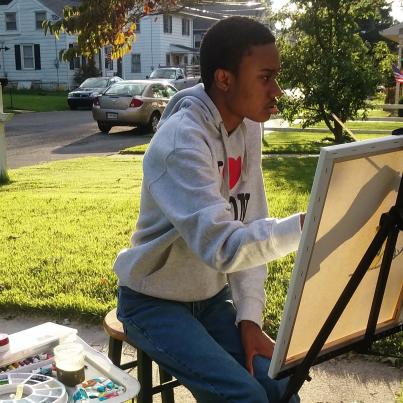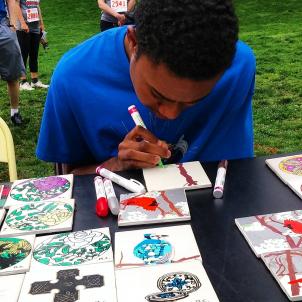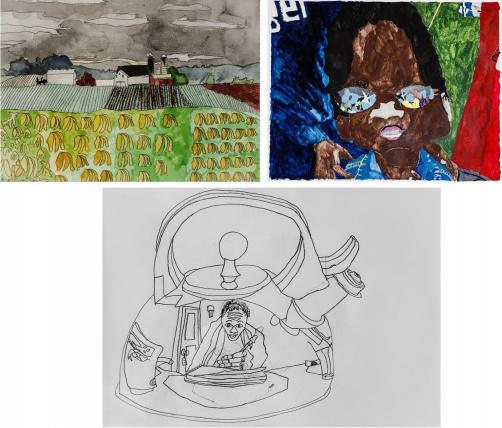A Schreiber kiddo grows into a young artist
September 14, 2018Maria Corley recognized pretty early on that her son Malcolm was different.
His paternal grandmother was a child psychologist, so she had experience with what typical childhood development looked like, Maria said.
“She noticed that he lined things up for me,” Maria said. “She saw the speech delays. The eye contact thing.”

An evaluation led to a diagnosis: PDD-NOS, or Pervasive Developmental Disorder-Not Otherwise Specified.
He was on the autism spectrum.
Malcolm was not quite 4 years old.
He started with Schreiber around the same time, first via home visits through Early Intervention then through appointments at the Center for therapy.
Emily Beddow was his occupational therapist almost from the beginning.
“He was 3, maybe 4, when I started seeing him,” Emily said. “We didn’t know if he’d even be able to write, (because of) the way he held his pencil. He’s really come a long way.”
He’s 19 now, tall and thin, like his mother. And he has artistic talents that started when he was young and have stayed with him into his young adulthood. When he was about 3, he started drawing images from the television show “Blues Clues.”
“Then he started doing Dr. Seuss pictures,” Maria said, “copying from ‘ABC’ and ‘Horton Hears a Who.’ When he started school, he had art class. You could see some talent there.”
Through school, his artistic talent continued to develop. He has had two solo art shows, the first through Millersville University’s Office of Visual and Performing Arts. That led to the second, at the Emerald Foundation’s Emerging Artist series.

At the same time, he has quietly launched a small business, Malcom’s Tiles, creating hand-decorated tiles that has helped him earn some money. He sold the tiles at the Lancaster-Lebanon Intermediate Unit 13 and at the National Autism Conference and raised enough money to pay for a trip he really wanted to take: to see the Dutch amusement park Juliana Toren.
“He found the park on YouTube, and he really wanted to go,” Maria said. “He wanted to go so he could hug the two mouse mascots.”
The importance of the experience wasn’t lost on Maria.
“I’m trying to impress on him the fact that making money is helpful,” she said. “If he has some sort of a job where he can also do art, that would be good.”
These are the things you think about when you have a child on the autism spectrum who is about to enter the adult world.
He was discharged from therapy a few years ago, but he still is part of the Schreiber family. He still attends Club 625 outings.
“It’s an important social outlet for him,” Maria said. “That’s something he really looks forward to, socializing with his peer group.”
And Emily and Lisa Christoffel, his speech-language pathologist, both keep in touch. They attended his art shows to show support.
“Some kids and some families leave more of an impression on you,” Lisa said. “I saw Malcolm for more than 10 years. He’s a special kid, and his mom has done such a great job with him.”
That feeling is definitely mutual.
“The caring I’ve felt from the people who have worked with him has been remarkable,” Maria said. “I could see the therapists were really invested in him as a person. When I brought him here, I didn’t even know what his voice sounded like, he was that non-verbal.
“From almost having no language at all, he has learned phrases that allow him to communicate and build relationships. He’s come a long way, definitely.”
The journey isn’t over by any stretch. Maria has the questions all parents have about their kids as they grow up: What will happen to him? How will he take care of himself? Will he have friends? It’s all just a so… unknowable with Malcolm.
“I’m not really sure what he thinks about friends and adult relationships,” Maria said. “Making friends is difficult. He’s interested in girls. He seems happy. But maybe he’s lonely and I just don’t know.
“We’ve talked about the fact that I’m not always going to be here, so he needs to learn to do things for himself.”
Maria will keep working with him on that, teaching him how to advocate for himself, helping him grow his art business. And like any other parent, she will hope for the best.
Maria Corley is a performing pianist and organist who plays concerts at venues around central Pennsylvania. She is also half of Duo Chiaroscuro with cellist Sara Male, frequently offering Silence Optional concerts for people on the autism spectrum. She has two children, Malcolm, 19, and a daughter, Kiana, 21. She lives in East Hempfield Township.
